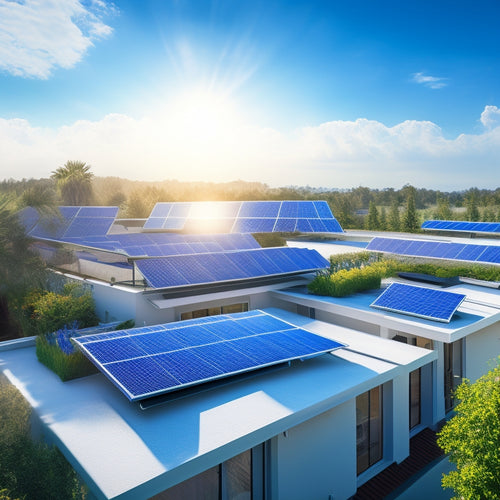
Best Home Solar Systems for Efficiency
Share
When it comes to maximizing energy production and savings, you'll want to focus on high-efficiency solar panels, best system design, and top-performing inverters and battery storage options. Look for premium panels from brands like SunPower and Panasonic, which offer high wattage ratings and durable designs. Confirm your system is designed with best orientation, accurate sizing, and high-quality wiring to minimize energy losses. Invest in a reliable inverter from brands like Enphase or SMA, and consider your battery storage options, including lithium-ion and sodium-ion batteries. By understanding these key factors, you'll be well on your way to creating a highly efficient home solar system that meets your energy needs - and you'll want to investigate each of these components further to release their full potential.
Key Takeaways
- High-efficiency solar panels with durable designs and reliable performance are essential for maximizing energy output.
- Optimal system design involves accurate sizing, high-quality wiring, and smart monitoring for real-time tracking and assessment.
- Choosing the right inverter type (string, power optimizer, or microinverter) depends on specific energy needs and budget constraints.
- Selecting the best solar battery storage option (lead-acid, lithium-ion, sodium-ion, or flow batteries) involves considering factors like lifespan, energy density, and cost.
- Maximizing energy output requires optimal solar panel orientation, regular cleaning, and monitoring system performance to identify and resolve issues quickly.
Top Rated Home Solar Panels
When considering home solar systems, selecting top-rated home solar panels is essential for ideal energy production. You'll want to choose solar panel brands that offer high-efficiency ratings, durable designs, and reliable performance.
Top brands like SunPower, Panasonic, and Trina Solar are known for their exceptional quality and energy output.
When evaluating solar panels, consider the installation costs and the overall value they provide. While premium panels may come with a higher upfront cost, they can generate more electricity per hour of sunlight, resulting in long-term savings.
Look for panels with high wattage ratings, low temperature coefficients, and sturdy warranties.
When selecting a solar panel brand, research the manufacturer's reputation, customer reviews, and third-party certifications like UL and IEC.
Be wary of extremely low-cost options, as they may compromise on quality and performance.
High Efficiency Solar System Design
Opt for a solar system design that employs the latest technology to maximize energy production. A well-designed system can greatly impact your energy output.
When it comes to high efficiency solar system design, you'll want to focus on the following key elements:
-
Optimal solar panel orientation: Confirm your panels are installed at the ideal angle and direction to capture the most sunlight throughout the day.
-
Accurate system sizing: A system that's too small won't meet your energy needs, while one that's too large will be a waste of resources. Calculate your energy requirements and size your system accordingly.
-
Efficient electrical wiring and connections: Minimize energy losses by using high-quality, low-resistance wiring and connections.
- Smart monitoring and tracking: Invest in a monitoring system that tracks your energy production and alerts you to any issues, guaranteeing you're always running at peak efficiency.
Best Inverters for Home Solar
Having confirmed your solar system is designed for maximum energy production, it's time to focus on the component that converts DC power from your solar panels into usable AC power for your home - the inverter. The inverter plays an essential role in ensuring the efficient operation of your solar system. When selecting an inverter, you'll need to take into account the type and brand that best suits your system's requirements.
There are three main inverter types: string inverters, power optimizers, and microinverters. Each has its advantages and disadvantages, which are summarized in the table below:
| Inverter Type | Advantages | Disadvantages |
|---|---|---|
| String Inverter | Cost-effective, easy installation | Can be affected by shading, limited monitoring capabilities |
| Power Optimizer | Optimizes energy production at the panel level, improved monitoring | Higher upfront cost, additional components required |
| Microinverter | Maximum energy production, real-time monitoring | Highest upfront cost, complex installation |
Top inverter brands include Enphase, SMA, and Fronius. When choosing an inverter, take into account factors such as efficiency, reliability, and warranty. By selecting the right inverter, you'll be able to maximize your solar system's energy production and enjoy a reliable source of power.
Top Solar Battery Storage Options
Most homeowners with solar systems recognize the importance of storing excess energy generated during the day for use during the night or on cloudy days.
You're likely evaluating various solar battery storage options to maximize your energy independence.
When selecting a solar battery, you'll encounter different types, each with its unique characteristics.
Here are four key options to examine:
- Lead-Acid Batteries: A cost-effective option with a shorter lifespan (5-7 years).
- Lithium-Ion Batteries: A popular choice with a longer lifespan (10-15 years) and higher energy density.
- Sodium-Ion Batteries: A newer alternative with a potentially longer lifespan and lower cost than lithium-ion.
- Flow Batteries: Ideal for long-duration energy storage, with a lifespan of up to 20 years.
Understanding these solar battery types will help you make an informed decision.
Maximizing Energy Output Factors
When it comes to maximizing energy output from your home solar system, several vital factors come into play. You need to take into account the solar panel orientation, which greatly impacts the system's overall performance. A south-facing orientation with a tilt between 30 and 40 degrees is ideal for most locations. However, this may vary depending on your specific climate and region.
Conducting a thorough shading analysis is also essential. Shading from trees, buildings, or other obstructions can drastically reduce energy output. You should assess potential shading issues and take measures to mitigate them, such as trimming trees or installing panels in a way that minimizes shading.
Additionally, you should verify that your solar panels are clean and well-maintained. Dirt and debris can reduce energy output, so regular cleaning is necessary.
Moreover, monitoring your system's performance and addressing any issues promptly will help maximize energy output. By taking these factors into account, you can optimize your home solar system's energy production and get the most out of your investment.
Frequently Asked Questions
Can I Install Solar Panels on a Metal or Clay Tile Roof?
You can install solar panels on a metal or clay tile roof, but be prepared for installation challenges, as these roof types require specialized mounting systems to guarantee roof compatibility and secure attachment.
Are Solar Panels Affected by Shade From Neighboring Buildings?
You're wondering if solar panels are affected by shade from neighboring buildings? Imagine a downtown San Francisco rooftop installation: when a nearby high-rise casts shade on one panel, it reduces solar panel efficiency by 10-15%, illustrating the significant shading effects on energy production.
Do Solar Panels Require Regular Cleaning and Maintenance?
You'll need to clean your solar panels regularly to maintain their efficiency; aim for every 6-12 months, depending on your location's dust and debris levels, to guarantee ideal energy output and prolong their lifespan through proper solar panel maintenance.
Can I Sell Excess Energy Back to the Grid?
You can sell excess energy back to the grid through net metering benefits, which allow you to offset your energy consumption, or participate in energy buyback programs, where utilities purchase surplus energy from you at a predetermined rate.
Are There Any Government Incentives for Home Solar Systems?
As you traverse the solar terrain, imagine sailing with a tailwind: you're already utilizing free energy, and now, you'll uncover additional enhancements. Yes, you're eligible for a federal tax credit of up to 26% of your system's cost, plus state-specific solar grants to further fuel your clean energy expedition.
Related Posts
-

Eco-Friendly Car Battery Solutions Available Online
You can now shop online for eco-friendly car battery solutions that not only reduce your carbon footprint but also of...
-

10 Best Ways to Purify Urban Air With EVS
You're looking for ways to purify urban air with Electric Vehicles (EVs). You can start by incorporating EVS Air Filt...
-

Best Solar Panel Options for Maximum Energy Savings
You can maximize your energy savings with solar panels that boast efficiency ratings above 20%, paired with extensive...


